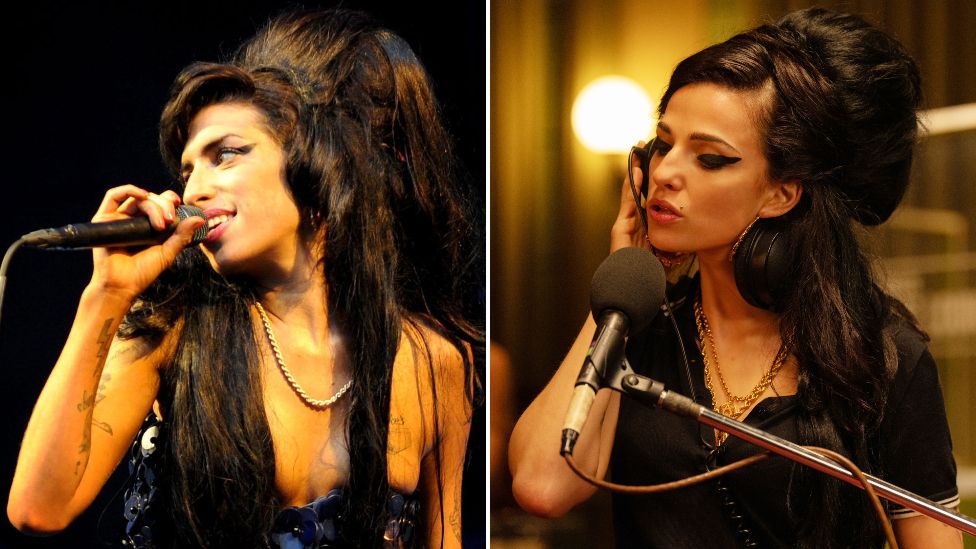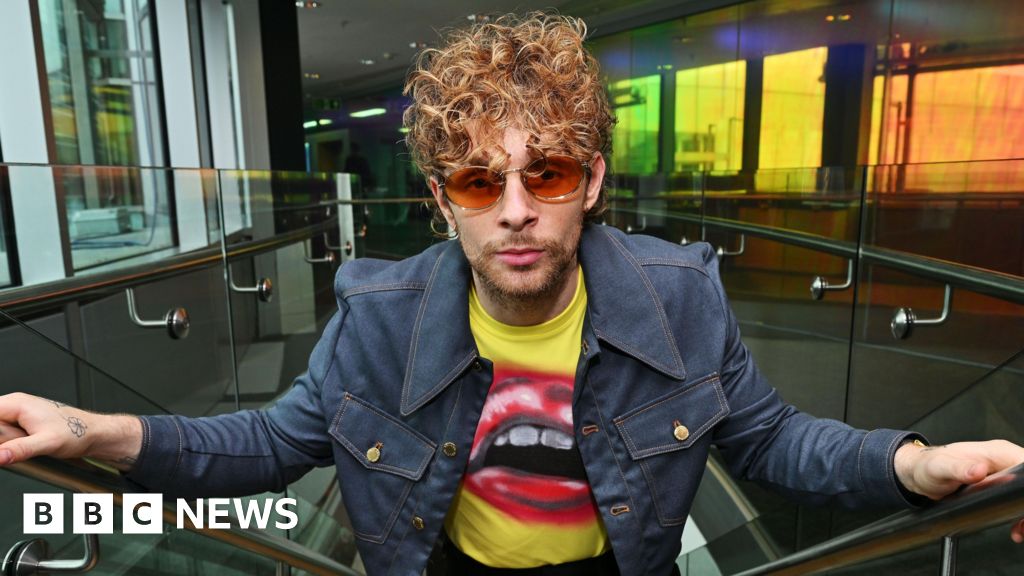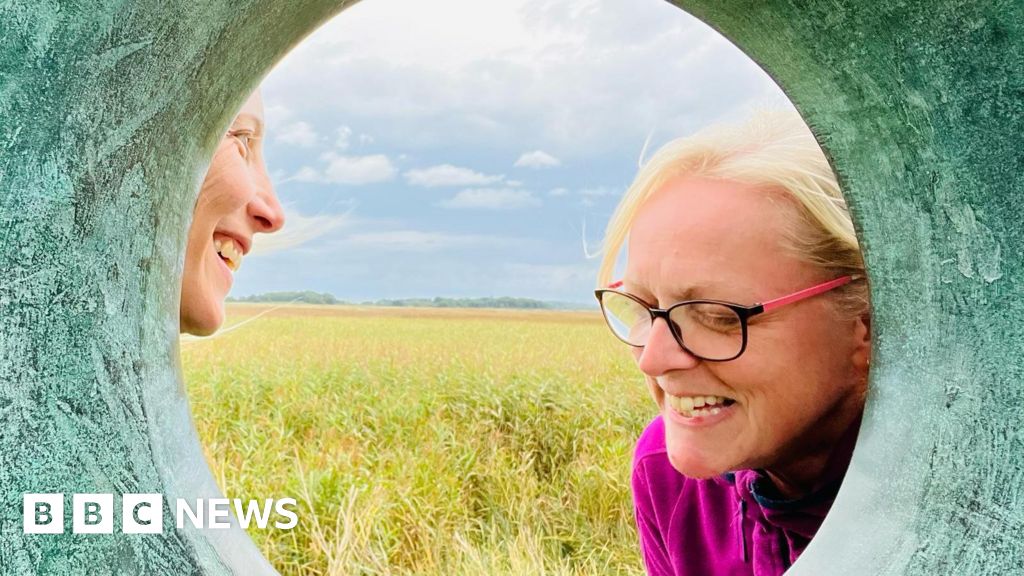ARTICLE AD BOX
 Image source, PA Media/Studio Canal
Image source, PA Media/Studio Canal
The real Amy Winehouse performing in 2008 (left), and actress Marisa Abela portraying the singer in the film
By Charlotte Gallagher
Culture reporter
In her short life, Amy Winehouse became a music legend, but her troubled personal life was often under intense scrutiny in the press.
Her relationship with Blake Fielder-Civil was tabloid fodder and she was pursued by photographers when she was at her most vulnerable.
The director of a new film about Winehouse says "paparazzi and addiction" are the villains in the movie, not her ex-husband.
Sam Taylor-Johnson tells the BBC it "wasn't her place to cast judgement".
The film, Back to Black, follows Winehouse's journey from a confident north London teenager to international megastar.
Marisa Abela, who appeared in Barbie and BBC drama Industry, plays Winehouse. Skins and This Is England actor Jack O'Connell takes on the role of Fielder-Civil.
Image source, Getty Images
Image caption,The singer's relationship with Blake Fielder-Civil is dramatised in the film
Taylor-Johnson, who also directed the 2009 John Lennon biopic Nowhere Boy, says she wanted to meet Fielder-Civil before filming but was not able to.
"We had to understand why Amy fell in love with him, so it wasn't about making a one-dimensional villain," she says. "We had to fall in love with him to understand why she wrote one of the greatest albums about their love.
"In terms of Blake, it wasn't my place to cast judgement on somebody who was obviously an addict, and [on] the two of them having this intense, albeit toxic, love affair."
Image source, Dean Rogers/Studio Canal
Image caption,Abela with Oscar nominee Lesley Manville, who plays grandmother Cynthia Winehouse
Taylor-Johnson and Abela may not have met Amy Winehouse's ex-husband, but they did meet other members of the singer's family.
The director visited Winehouse's parents before production began "out of respect" because she was making a film about their daughter.
But she says they were not involved in the making of Back to Black, and could not say "what I could and could not do".
However, the family did later visit the set and met Abela while she was dressed as Amy. The actress says: "It was incredibly important for me to be respectful and be aware of the sensitivity of that moment."
Image source, Dean Rogers/Studio Canal
Image caption,Amy Winehouse's father Mitch is played by Eddie Marsan
A film biopic about Winehouse has not been universally popular, with some saying it is too soon after the singer's death from alcohol poisoning in 2011. She was just 27 years old.
Reviews have yet to be published, but after the Back to Black trailer was released, some social media users complained that Abela does not look or sound enough like the late singer.
Abela sings in the film but says "it was a relief" that it was not a prerequisite for taking on the role, saying she was "in awe" of Winehouse.
The actress had singing lessons before filming. "What was important for me was that music was the medium which Amy wanted to tell her story, and if you sing in any way that resembles Amy's style of singing, then you can tell each story as she would have wanted to tell it.
"I was so excited by the idea of playing and getting in touch with Amy the girl, then Amy the singer. The woman before the icon."
Taylor-Johnson says it was important for her to cast someone "who wasn't going to impersonate Amy".
"There were many brilliant impersonators and people that looked like her or sounded like her. But Marisa came in as herself, she was the only one in the audition process who didn't try to look like her in any way, earrings, eyeliner or anything."
Image source, Getty Images
Image caption,Amy Winehouse once had to be escorted to her home by police due to paparazzi and crowds
The media's pursuit of Amy Winehouse is one of the main themes of the film, with paparazzi shown camping outside her home and mobbing her in the street.
One scene shows her falling over outside a pharmacy and photographers descending to get the best shot, not helping her up.
These may be dramatised events, but the star's treatment by the media is well documented.
Looking back at articles written about the singer while she was the height of her addiction is uncomfortable reading.
"Not even a hefty slather of make-up can hide the shocking state of Amy Winehouse's skin," reads one.
Another says: "It comes to something when the pin-up girl tattooed on your arm looks better turned out than you do."
In hundreds of paparazzi photos, the singer is also obviously upset and unwell.
'Hopefully Amy would be proud of herself'
But have times changed? And would the media's treatment of Winehouse and other stars like Britney Spears still happen now?
Asked whether society and media have moved on, Taylor-Johnson replies: "I felt like we maybe had evolved to this place of maybe that wouldn't happen now - but it feels like it is happening now."
Both Abela and Taylor-Johnson want their film to show what an incredible musician Winehouse was, and for people to leave cinemas and listen to her songs.
"I think she would feel we have sort of gifted her her music back again in a different light," the director says.
"Hopefully she would feel proud of it and us."
Abela adds: "And of herself too, as a catalogue of her achievements and what is was she was able to create as a very young woman.
"I hope she would watch it and feel proud of everything she created."
Back to Black will be released in UK cinemas on 12 April.

 1 year ago
44
1 year ago
44








 English (US) ·
English (US) ·